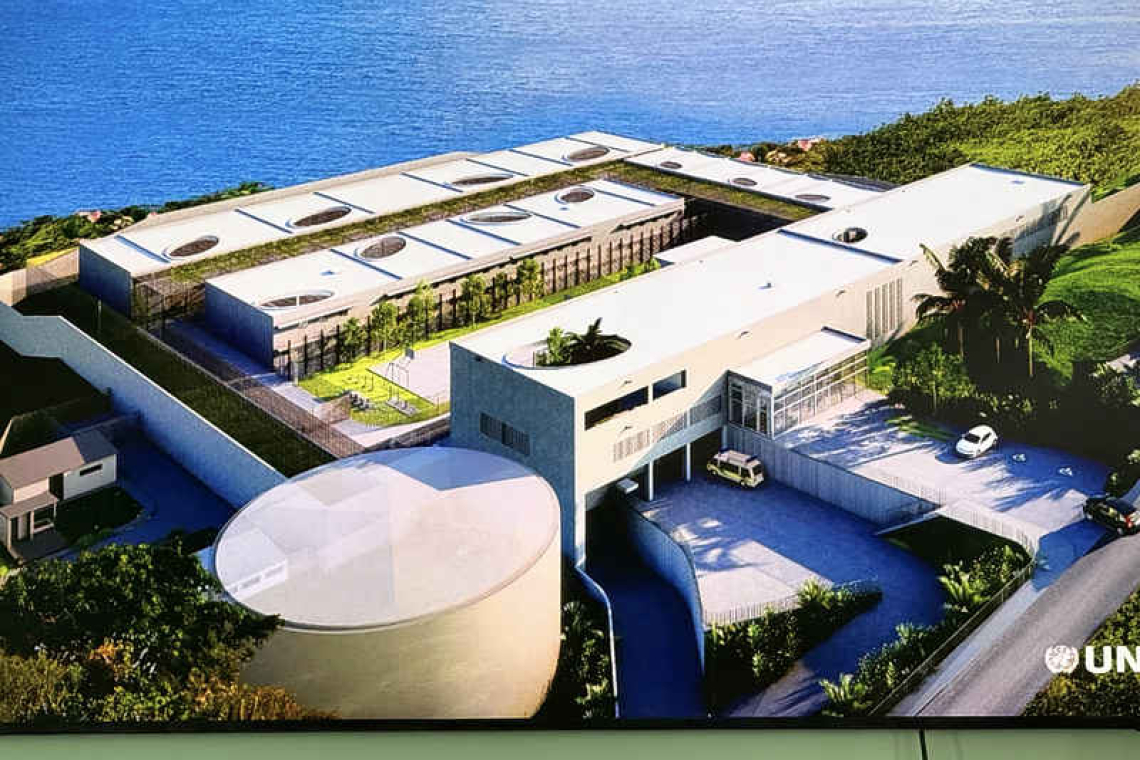Architectural rendering of what the new prison will look like.
PHILIPSBURG--The official launch of the US $52 million Detention Sector Reform Program (DSRP) took place at a press conference Thursday, marking a new chapter in reshaping the way a detention centre will be operated in St. Maarten, and the way justice is lived and experienced in the country.
Justice Minister Nathalie Tackling in her introduction said that it was a day to rejoice but it was not an overnight achievement, as she reminded that last week the opening of the Point Blanche prison 35 years ago was commemorated.
“Today is the culmination of years of work and results, technical assessments, design, policy planning, and, more importantly, collaboration,” she explained while also acknowledging the work of her predecessors. “It’s built on the voices of those who live the reality every day, detention officers, justice workers, and the community.
“It is also the outcome of close cooperation with our colleagues, National Recovery Program Bureau (NRPB), international partners United Nations Office for Project Services (UNOPS) and United Nations Office on Drugs and Crime (UNODC), who will bring invaluable expertise to the process.”
Tackling thanked the Council of Ministers for their continued support and engagement. “This is our reform, our national effort, built on collective leadership and shared responsibility. I trust it will serve as the foundation for many reforms to come.”
She thanked the men and women who work in the detention chain in challenging circumstances, from pre-trial to post-detention. “Your commitment has kept the system standing, your feedback has helped and will continue to shape the reform.”
With UNOPS, a modern and humane state-of-the art detention facility that meets the highest international standards will be constructed, providing a safe environment for inmates and staff. The facility will have double the current capacity of inmates and spaces for education, health care, mental health, vocational training, family visits and recreation.
Construction will begin in early 2026 and take approximately three years to complete. A team from UNODC is already working with justice professionals to strengthen leadership, improve training, and build programmes that prepare people to return to society with skills, confidence and purpose.
“This reform is locally owned, locally led, designed for the people of St. Maarten and represents what is possible when we take ownership of our challenges and use partnerships to strengthen but not replace our leadership,” Tackling continued.
“For our prison staff it means safer working conditions, better training and an environment that supports their professionalism and well-being. For those in custody, it means dignity, structure and a chance to rebuild their lives. For the community, it means a safer St. Maarten where rehabilitation reduces reoffending, and families are strengthened.”
DSRP Programme Manager Richelda Emmanuel said the reform programme integrates multiple projects under one framework, and will include the involvement of the Ministry of Education, Healthcare, and more departments. The aim of the reform is to strengthen the entire detention system, to be “fair, humane and sustainable.”
She said NRPB’s role as manager of the reform programme is completely separate from the trust fund element that the public is familiar with.
UNOPS Regional Director Giuseppe Mancinelli called the DSRP a “historic moment for St. Maarten” before giving an overview of the different phases of the project and timeline. He said a specialist international contractor will be engaged due to the complexity of the construction, but local sub-contractors will also be used to assist the local economy.
The other speaker was Vera Tkachenko, Crime Prevention Officer at UNODC headquarters. UNODC had done an assessment of the project back in April.
Tkachenko said there are currently more than 11 million prisoners incarcerated worldwide, and one third of them are on remand waiting for their trial to happen, which can take months and years.
“The female prison population is also increasing in developing countries,” she said. “The trends are not very positive. We see more and more countries approaching UNODC for penal and prison reform. The transition from the old prison in St. Maarten to the new prison is going to be challenging. Preparation of the prison staff is paramount. Our UNODC Programme Officer will be leading a group of experts in this transition over the next four years.”
Prison Director Steven Carty said, “On behalf of my staff this moment has been so long awaited. It’s always been a feeling of ‘I have to see it to believe it.’ But the despair we have been having for so many years has changed to a smile today.”







